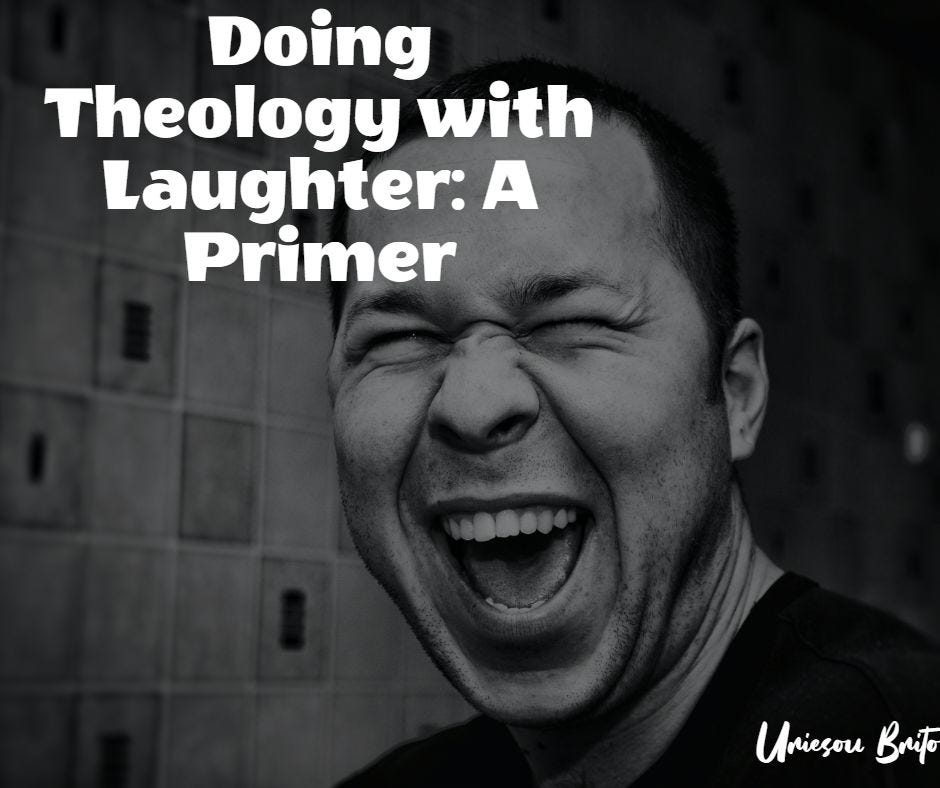Doing Theology with Laughter

I have always loved theological discourse. I had my share of interactions in high school and made a few of my classmates endure the cadence of my naivete. Of course, whatever I believed at the height of my 18th birthday was pure Gospel, unadulterated. From my views on the Sabbath to Supralapsarianism (the latter which never appealed to me, btw), everything I spoke was spoken with the conviction of a seasoned dogmatician. And in those days, I was not well-read, which added an additional percentage of hubris to my declarations.
One thing that permeated those early years from 18-22 was my impeccable ability to convince myself that what I argued was passionately serious and seriously passionate. It came from my deep inner being saturated with certainty.
Take, for instance, the renowned doctrine of Calvinism with its soteriological vigor. When I first embraced the soteriology of Calvinism I believed firmly that I was embracing the sine qua non of theological hierarchy. Again, I defended it fervently around my sophomore in college as if it were the highest and most significant element of Christendom. As I have written in a previous post, I had to do a repentance tour for my unfavorable debating techniques.
But I have always loved the discourse. I loved the dialogue late at night in the hallway. I loved pulling out my Greek text and looking at particular pericopes and savoring James’s words together with others. All those conversations prepared me for graduate studies both at the Masters’ and Doctoral levels. Indeed, good conversations, especially around theology, shall save the world. I still hold to that, even though I abused my place at various times.
But here is the nuance to this process, which most of us who do this for a living and the studious parishioners must consider. And it hit me again when I read it from my old mentor, John Frame, who wrote:
“Don’t lose your sense of humor. We should take God seriously, not ourselves, and certainly not theology. To lose your sense of humor is to lose your sense of proportion. And nothing is more important in theology than a sense of proportion.”
The discourse is not the end-all. At the end of a long exchange of words, friendships are the end-all. Communion is the heart and reason for the discourse. If we lose our closest allies in the process of doing theology, we lose theology at its best, which is often the result of taking ourselves too seriously; of lacking the comedy of life which makes every encounter and relationship more valuable.
A regular comment I have made to my congregation over the years is that a man can speak the truth in a thousand ways, but if love is not the companion of the truth it rarely communicates effectively. I am certain I won a thousand debates in college. I was a disciplined Bible student, but as I look back I also know I lost half of those debates because I failed to achieve the telos of human discourse, which is to lead my companion to a better understanding of God and love for neighbor.
We have lost our sense of proportion in doing theology because theology is no longer the domain of the good, but the domain of the greedy. There is all the time in the world for the righteous anger of good theologians opining against real evil. That too is a form of theological discourse. But mostly, in our unique communities, our discourse needs to happen more often with cigars and drinks in a sacred environment of peace and humor.
The present evangelical scene is already too primed for destructive interactions. To do theology well we need a sense of proportion. Not everything can be life or death, but everything should be light and best around a table. All things are best when the discourse happens around the mutual agreement on proportion.
When theology loses that sense, we fail to do it as well as it should. Theology–the study of God–is the story of everything that is good, true, and holy. When it is a tool of rhetorical pugilism, it quickly loses its appeal. But when it is a tool of discovering corporately the goodness of life, the splendor of the Bible, and the majesty of God it is then the best life offers.
If that process succeeds, more often than not, and if we can make our theologizing a source of joy, we may even contemplate our role as angelic, for the angels–as Chesterton notes–can fly because they can take themselves lightly.
The post Doing Theology with Laughter appeared first on Kuyperian Commentary.

